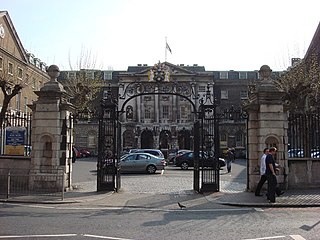Harassment is a topic which, in the past few decades, has been taken increasingly seriously in the United Kingdom, and has been the subject of a number of pieces of legislation.
United Kingdom employment equality law is a body of law which legislates against prejudice-based actions in the workplace. As an integral part of UK labour law it is unlawful to discriminate against a person because they have one of the "protected characteristics", which are, age, disability, gender reassignment, marriage and civil partnership, race, religion or belief, sex, pregnancy and maternity, and sexual orientation. The primary legislation is the Equality Act 2010, which outlaws discrimination in access to education, public services, private goods and services, transport or premises in addition to employment. This follows three major European Union Directives, and is supplement by other Acts like the Protection from Harassment Act 1997. Furthermore, discrimination on the grounds of work status, as a part-time worker, fixed term employee, agency worker or union membership is banned as a result of a combination of statutory instruments and the Trade Union and Labour Relations (Consolidation) Act 1992, again following European law. Disputes are typically resolved in the workplace in consultation with an employer or trade union, or with advice from a solicitor, ACAS or the Citizens Advice Bureau a claim may be brought in an employment tribunal. The Equality Act 2006 established the Equality and Human Rights Commission, a body designed to strengthen enforcement of equality laws.

The Employment Equality Regulations 2003 were secondary legislation in the United Kingdom, which prohibited employers unreasonably discriminating against employees on grounds of sexual orientation, perceived sexual orientation, religion or belief and age.

Sir Stephen John Sedley is a British lawyer. He worked as a judge of the Court of Appeal of England and Wales from 1999 to 2011 and was a visiting professor at the University of Oxford from 2011 to 2015.
United Kingdom agency worker law refers to the law which regulates people's work through employment agencies in the United Kingdom. Though statistics are disputed, there are currently between half a million and one and a half million agency workers in the UK, and probably over 17,000 agencies. As a result of judge made law and absence of statutory protection, agency workers have more flexible pay and working conditions than permanent staff covered under the Employment Rights Act 1996.

The Employment Equality Regulations 2003 is a plank of United Kingdom labour law designed to combat discrimination in relation to people's religion or belief, or absence of religion or belief. They were introduced in order to comply with the European Union Directive 2000/78/EC and complement similar measures on sexuality, age, disability, race and gender discrimination. The EU Directive in turn is similar to legislation passed in the United States.

Pearce v Mayfield Secondary School Governing Body and Advocate General for Scotland v MacDonald [2003] UKHL 34; [2003] IRLR 512 is a UK labour law case concerning sexuality and sex discrimination. It was decided before the new Employment Equality Regulations 2003.

Smith v Gardner Merchant [1998] IRLR 510 is a UK labour law case, concerning the possibility of claiming compensation for discrimination under the gender statutes. It took place before the Employment Equality Regulations 2003 were introduced.

Luke v Stoke-on-Trent City Council [2007] EWCA Civ 761 is a UK labour law case, concerning the test for an implied term.

HJ (Iran) and HT (Cameroon) v Secretary of State for the Home Department [2010] UKSC 31 is a case decided by the Supreme Court of the United Kingdom concerning two men, from Iran and Cameroon respectively, claiming asylum in the United Kingdom on the grounds of their homosexuality. The men's claims had previously been turned down on the basis they would not face persecution in their own countries if they would conceal their sexuality. The appeal therefore centred on the question as to whether the men on their return could reasonably be expected to tolerate this requirement of discretion; the so-called 'discretion' or 'reasonable tolerability' test. Interventions were made by the Equality and Human Rights Commission and the United Nations High Commissioner for Refugees.

McFarlane v Relate Avon Ltd[2010] EWCA Civ 880; [2010] IRLR 872; 29 BHRC 249 was an application in the Court of Appeal of England and Wales for permission to appeal against a decision of the Employment Appeal Tribunal, that a relationship counsellor dismissed for refusing to counsel same sex couples on sexual matters because of his Christian beliefs did not suffer discrimination under the Employment Equality Regulations 2003. The application was heard by Lord Justice Laws, who issued his decision on 29 April 2010 refusing the application.

British Nursing Association v Inland Revenue[2002] EWCA Civ 494 is a UK labour law case regarding the National Minimum Wage Act 1998.

Majrowski v Guy's and St Thomas' NHS Trust [2006] UKHL 34 is a UK labour law case holding that an employer will be vicariously liable for the harassment of an employee by another.

Ladele v London Borough of Islington [2009] EWCA Civ 1357 is a UK labour law case concerning discrimination against same sex couples by a religious person in a public office.
Dacas v Brook Street Bureau (UK) Ltd [2004] EWCA Civ 217 is a UK labour law case, concerning the employment rights of agency workers.

Muschett v H M Prison Service [2010] EWCA Civ 25 is a UK labour law case, which held that an agency worker had no right to claim discrimination from either the agency or the place of work.
Hall v Woolston Hall Leisure Ltd [2000] EWCA Civ 170 is a UK labour law case, concerning the illegality in the contract of employment.
Homer v Chief Constable of West Yorkshire Police [2012] UKSC 15 is a UK labour law case, concerning discrimination under what is now the Equality Act 2010.

Stefanko v Doherty and Maritime Hotel Ltd [2019] IRLR 322 (EAT) is a UK labour law case concerning unfair dismissal and discrimination.
Royal Mail Group Ltd v Efobi [2021] UKSC 33 is a UK labour law case, concerning race discrimination and the burden of proof.